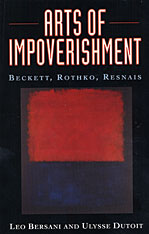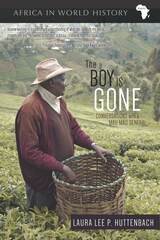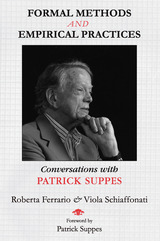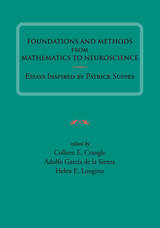
“How almost true they sometimes almost ring!” Samuel Beckett’s character rues his words. “How wanting in inanity!” A person could almost understand them! Why taunt and flout us, as Beckett’s writing does? Why discourage us from seeing, as Mark Rothko’s paintings often can? Why immobilize and daze us, as Alain Resnais’s films sometimes will? Why, Leo Bersani and Ulysse Dutoit ask, would three acknowledged masters of their media make work deliberately opaque and inhospitable to an audience? This book shows us how such crippling moves may signal a profoundly original—and profoundly anti-modernist—renunciation of art’s authority.
Our culture, while paying little attention to art, puts great faith in its edifying and enlightening value. Yet Beckett’s threadbare plays Company and Worstward Ho, so insistent on their poverty of meaning; Rothko’s nearly monochromatic paintings in the Houston Chapel; Resnais’s intensely self-contained, self-referential films Night and Fog and Muriel all seem to say, “I have little to show you, little to tell you, nothing to teach you.” Bersani and Dutoit consider these works as acts of resistance; by inhibiting our movement toward them, they purposely frustrate our faith in art as a way of appropriating and ultimately mastering reality.
As this book demonstrates, these artists train us in new modes of mobility, which differ from the moves of an appropriating consciousness. As a form of cultural resistance, a rejection of a view of reality—both objects and human subjects—as simply there for the taking, this training may even give birth to a new kind of political power, one paradoxically consistent with the renunciation of authority. In its movement among these three artists, Arts of Impoverishment traces a new form of movement within art.

A story with the power to change how people view the last years of colonialism in East Africa, The Boy Is Gone portrays the struggle for Kenyan independence in the words of a freedom fighter whose life spanned the twentieth century’s most dramatic transformations. Born into an impoverished farm family in the Meru Highlands, Japhlet Thambu grew up wearing goatskins and lived to stand before his community dressed for business in a pressed suit, crisp tie, and freshly polished shoes. For most of the last four decades, however, he dressed for work in the primary school classroom and on his lush tea farm.
The General, as he came to be called from his leadership of the Mau Mau uprising sixty years ago, narrates his life story in conversation with Laura Lee Huttenbach, a young American who met him while backpacking in Kenya in 2006. A gifted storyteller with a keen appreciation for language and a sense of responsibility as a repository of his people’s history, the General talks of his childhood in the voice of a young boy, his fight against the British in the voice of a soldier, and his long life in the voice of shrewd elder. While his life experiences are his alone, his story adds immeasurably to the long history of decolonization as it played out across Africa, Asia, and the Americas.



“Taut and illuminating . . . memorable . . . written with the humility of he who confesses himself and with the honesty of he who bore witness.”—Primo Levi
“The writing of memoirs is a difficult art that Dan Segre fully possesses. Under his pen, history and psychology merge in one captivating narrative which illuminates the turmoils, fears and triumphs of his generation.”—Elie Wiesel
“Beautifully written. . . . [A] labyrinthine, spell-binding autobiography, full of passionate tenderness.”—New York Review of Books
“An unusually attractive book—attractive in its irony, its energy and its moral insight. Mr. Segre had some rich material to work with, and he has done it justice.”—New York Times
READERS
Browse our collection.
PUBLISHERS
See BiblioVault's publisher services.
STUDENT SERVICES
Files for college accessibility offices.
UChicago Accessibility Resources
home | accessibility | search | about | contact us
BiblioVault ® 2001 - 2024
The University of Chicago Press









